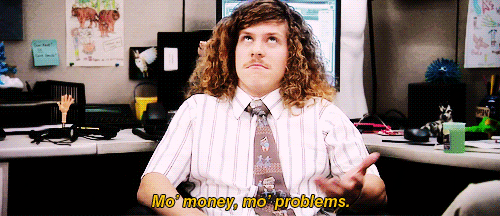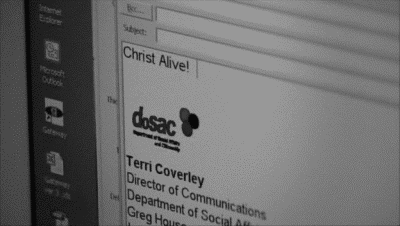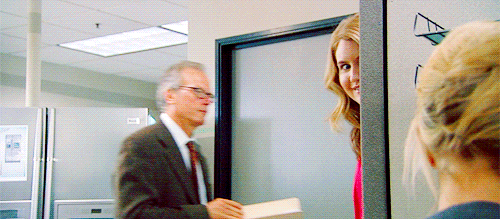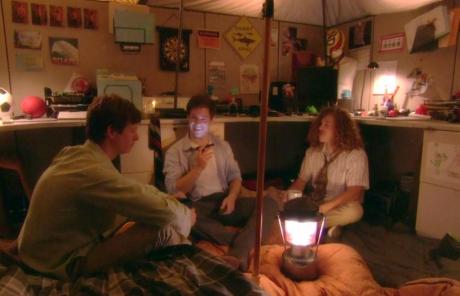The modern office is fraught with dangers. From the risk of getting fired, to stress, repetitive strain injury (RSI), mindnumbing boredom and more. This helpful guide from libcom.org will help you navigate these hazards to a happy work life, and perhaps a slightly better world…
Of course not all of the tips will be appropriate in every setting so pick and choose the right ones for you, depending on how safe your job is how much you care about it.

Appearance
A vitally important aspect of office life is how you come across to management and colleagues. If you want the kudos of being a hard worker, without all the bothersome hard work, then you need to look the part:
- Always look busy.

- Keep your desk covered in piles of paperwork.
- Don’t say yes to meeting invitations right away, always check your diary first (even if you know you don’t have anything in it) and frequently say you can’t make certain times, and suggest others instead.
- Wherever you go, take files with you. If you walk briskly with files, you can go chat to colleagues, go for a walk, etc but it will look like you are going to do something important.
- Instead of actually working late, just leave your monitor on and leave a cardigan on the back of your office chair to make it look like you are still at the office when actually you’re already at home with your feet up watching Gossip Girl. You could even leave a half empty cup of tea/coffee on occasion, and maybe even a half eaten bourbon biscuit (or other crappy biscuit, you wouldn’t want to waste a good one).
- Use the e-mail scheduling function in Outlook (or whatever your e-mailing software is) to send e-mails late at night and early in the morning to make it look as if you have still been working.
- Eat lunch at your desk – but after actually taking your full lunch break off. Thus maximising your free time and looking like a dedicated employee.

- Have loads of programme windows open on your computer. This helps mask your web browser windows!
- Often have your voicemail box be full. Fill it with messages yourself if necessary.
- Help out workmates with little jobs. It makes you look helpful, and can make you popular, while not causing too much stress, and it makes life easier for them. And it makes others more likely to help you out when you’re overloaded or don’t know how to do something. And of course it’s always nice do something which actually helps people, unlike much of your job.
Take it easy
Stress kills. Not only that, but working too fast is antisocial behaviour. If that sounds odd, let me explain: slow work means that more workers are needed. More workers means lower unemployment. Low unemployment means greater demand for labour, which puts an upward pressure on wages. So working fast means higher unemployment and lower wages. It also singles out those unable to work quickly enough, such as some disabled or elderly staff, putting them at risk of dismissal. Don’t do it!
- Take the breaks you are entitled to. Look at your legal rights in your country, and your employer’s procedures and practices. Encourage colleagues to do the same so individuals can’t be singled out.
- Take additional breaks wherever you can. Many office-based workplaces will have health and safety policies recommending 5 to 10 min breaks every hour to help prevent RSI/eyestrain etc. Take them! You can also sneak breaks by smoking, or better for your health go out and chat with smoker colleagues on their breaks: after all, it wouldn’t be fair if non-smokers weren’t allowed similar breaks.
- Have naps. Regular naps reduce stress and can make a work day much more enjoyable. Try to find a private spot where you can grab 40 winks without being spotted. A lockable room like a private bathroom or one where your face can’t be seen, so you can quickly wake up and pretend you weren’t sleeping if anyone comes in.

- If you figure out a way to make your work quicker, or make the process more efficient, don’t tell your boss! They may just give you extra work or worse reduce your hours or make staff redundant. Keep your innovation to yourself and use your additional time to do things you want to do, like write your novel, send personal e-mails or just mess about. You could always offer to take on a little bit more work, to make yourself look efficient without giving away how much free time you really have.

- Informally with workmates try to establish a rate of work which you are all happy with and which isn’t too fast, and don’t let management know what you’re doing! If a new member of staff starts make sure you induct them into how you do things.
- If in your job you get the chance to work from home, try to get the work done in advance but don’t give it to the boss. Then when you’re at home sit around in your dressing gown eating Doritos and masturbating, and every couple of hours just send in a bit of work you had already completed.

- Take sickies when you need them. If you can find out what the average sickness absences at your workplace, make sure you get at least the average. Aside from giving you a break, it can help prevent discrimination against any disabled workers who have to take time off. If colleagues get annoyed about people being off sick, encourage them to take time off as well to level the playing field.
- Volunteer to do jobs which take you out of the office, especially with close colleagues. Not only does this make you look helpful, but it can give you the opportunity to go to a cafe, go around the shops, sit in a park, grab some beers etc.

- If you suffer from mental health problems or another disability and you are overworked, your employer may be required to make adjustments for you, which could include reducing your workload. Get advice on this from a trade union, or advocacy organisation in your area.
- If you and your colleagues are all overloaded, meet together and try to collectively agree a way to challenge it. You can have a look at our workplace organising section for suggestions on how to do this.
- Don’t be a pushover: people who agree to do too much for bosses just get asked to do more. So try to be clear with your boundaries.

- Finally, nothing eases the stress of work like a little sabotage. Okay so you can’t get those 45-odd working years of your life back, but finding your own ways of getting a little revenge feels bloody good.

Making the most of your pay
As wage slaves, the money is why we turn up each day. Obviously, the more of it for the least work the better for workers, although of course the opposite is true for our employers (here lies the central contradiction of capitalism). So they are always coming up with ways to try to get us to do more work for less. Here are some ways of turning the tables…

- Eat breakfast at work. Why get up earlier and eat at home, when you could be getting paid to have breakfast?! (Depending on your workplace there may also be free coffee and milk)
- Steal as much as humanly possible. Work steals our whole lives, so never feel bad about this, as we could never steal back everything which is taken from us. From time (doing what we want to do, rather than what the boss wants us to do) to stationery, to tea and coffee to computer equipment and beyond – get everything you can making sure you don’t get caught.

- If management don’t always see when you get in or when you leave, arrange with your workmates to take it in turns to get in late and leave early. If you use time cards, punch each other in.
- Try not to work any unpaid overtime, and encourage colleagues to do the same so “troublemakers” can’t be victimised.
- Go to the toilet in work time when possible. Don’t go in your lunch break, as you probably won’t be getting paid for it. And you’ll save money on toilet paper.
- Make the most of your work printers and photocopiers. Print out your personal photos, long texts you’ve downloaded and would like to read, photocopy revolutionary pamphlets, leaflets, posters and anything else you can think of.
- Take a look at our sabotage section which is full of accounts of workers slacking off on the job and getting the most out of their employers.
Not getting fired
Some jobs are more secure than others. Your risk of getting fired also varies greatly depending on the country you live in and your employment status (agency, permanent, etc). So here are some general tips to make it less likely as whatever your situation:
- Try to make yourself indispensable. Try to either get or hold onto some important responsibilities. If you are the only one who knows how to do something, guard this knowledge closely. Keep shortcuts you know for doing things quickly to yourself.
- Know your rights. Read up on your employment rights in your area and for your type of contract, and your employer’s procedures. The more you know the better position you will be in to protect yourself from dismissal.
- Join a union. If there is a recognised union at your workplace, you should join it as an insurance policy. Look into their track record first to see if it is worthwhile. If there isn’t a recognised union depending on where you are you could join a general union which might be able to represent you if you got in trouble.
- Get to know your employer’s code of conduct and acceptable behaviour, so you know what lines not cross.
- Hide the fact you’re a slacker!
- The best defence against redundancy or disciplinary firing is the solidarity of your workmates. If you can get your co-workers to stick together and take action to defend each other this is the most effective way of stopping dismissals. See our workplace organising guide for suggestions on how to do this, or our workplace activity section to read the organising experiences of others.

The internet
The internet can be a bit of a minefield at work. On the one hand it offers more opportunities for rewarding shirking than ever before (I have often wondered what office workers did in the days before the net, just stare at their typewriters?). On the other hand, it is easy for employers to monitor and can get you fired. In general you could take your cues from other colleagues, especially more long serving staff. If you know that lots of people surf the web all the time, and no one has ever been disciplined then maybe you can relax. But you should be aware that employers can easily track all internet and e-mail use, and can discipline or dismiss workers easily for personal use of them.
These tips are based on it being better safe than sorry:
- If you are someone who management doesn’t like, or if your employer is going to be making redundancies, it can be advisable to be on best behaviour with respect to internet use, because some employers can use workers’ web use to sack people they don’t like, or to make redundancies on the cheap. Pointing out others being worse than you won’t help you.
- Steer clear of any indecent/profane material. This can definitely get you sacked, and many employers use software which automatically looks for swear words on your screen or in e-mails, so stay away from it. Especially don’t use work e-mail to slag off bosses or other colleagues.

- If you have a smart phone or tablet computer with mobile internet you can either legitimately or sneakily use, that would be a safer way of browsing without your boss being able to track it.
- If you are going to browse the net at work, be aware of who can see your screen. You can even put a mirror on your desk (or leave mirrored sunglasses) to watch for your boss coming with your fingers ready on the alt and tab keys!

- To be safest of all, you could just copy and paste websites you want to read into Word documents, then either bring them to work on a USB stick to read them, or upload them to your personal e-mail account’s drafts folder and download them from there, but don’t save them to your work computer. You can also do other personal projects like this, such as work on your own blog or help format articles for our library. Better still, write your own account of your working life or your one woman/man workplace rebellion and post it up on libcom!
Now you have read this handy guide, you are ready to shirk, like a boss.




